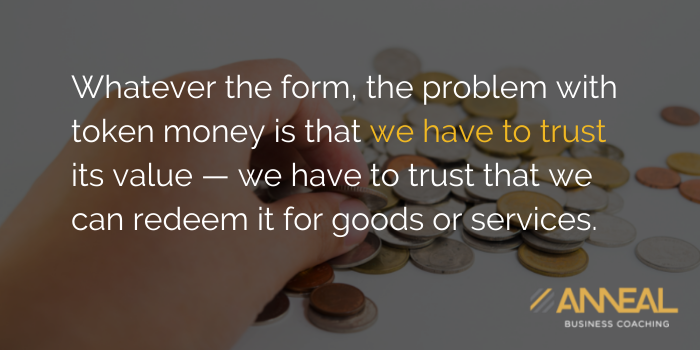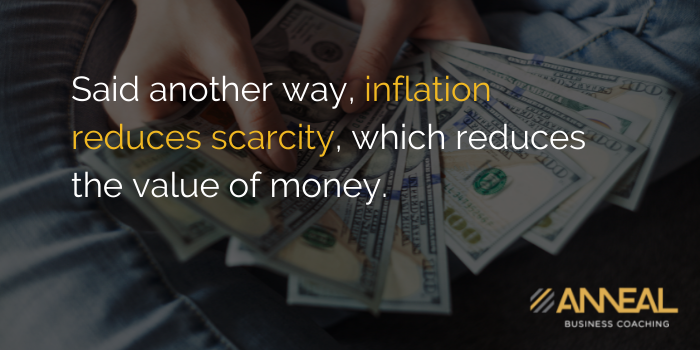Money is a token that represents effort. When you provide goods or services to someone, the money they pay you represents the agreed value of the effort you put into providing those goods or services.
Our ancient ancestors created money because it eliminated the need for barter. Barter — exchanging goods or services directly for other goods or services — works, but is very, very inefficient. Bear with me, and I’ll show why.
Let’s say you dig a well for a farmer and he pays you with corn. That’s great if you need corn, but what if you need a new pair of boots instead? Now you have to find a cobbler who needs corn. If there were none, maybe you could find a tanner who would accept it in exchange for leather which you could then trade with the cobbler for boots. At every step in the process, you’d have to negotiate the exchange rate for well-digging, and corn, and leather, and boots (and for any other commodities in the transaction chain). It would be an exhausting process that left you little time to dig more wells to earn more corn.
In reality, barter can require many, many more steps than our simple well-corn-leather-boots transaction.
Enter money tokens. If the farmer paid you with money tokens instead of corn, you could use them to pay the cobbler, who could use them to buy his own shoe leather or whatever else he wanted — a much simpler and therefore efficient process.
Money tokens have evolved over time from seashells, to precious metal ingots, to coins minted from valuable metals, to printed paper, to digital currencies. Whatever the form, the problem with token money is that we have to trust its value — we have to trust that we can redeem it for goods or services. Adam Smith got it right back in 1776 when he wrote: “All money is but a matter of belief.”

To engender trust, all money tokens from seashells to digital currency, must be recognizable, durable, portable, divisible, and, importantly, scarce.
The threat to trusting money tokens is, and has always been, inflation. Inflation is an increase in the supply of money tokens without a corresponding increase in goods or services. Said another way, inflation reduces scarcity, which reduces the value of money.

To see the effect of inflation, let’s say your farmer paid you in seashells instead of corn. If I discovered a beach where I could effortlessly scoop up seashells by the bucket full, I could easily outbid you for boots at the cobbler’s shop. We would say that the price of boots went up, or, which is the same thing, that the value of seashells went down. That’s inflation.
Economies tend toward chaos when people can’t trust the value of their money — when they can’t be sure of redeeming tokens for goods and services equal to the effort they put out to earn them.
All historic forms of token money (with the possible exception of precious metals*) suffer inflation. Advances in travel made it easier to collect seashells from distant beaches. Governments debase the value of minted coins by substituting common metals for valuable metals (our “copper” pennies are now made of zinc), and governments routinely inflate paper and digital money by simply printing more paper or “decreeing” an increase in digital money supply.
Inflation has always been the insurmountable problem with money.
Over the last decade or so, some really smart people worked to resolve the problem. They developed cryptocurrencies such as Bitcoin to preserve the benefits of token money while eliminating the curse of inflation.** If they succeed, cryptocurrencies will be the first token money that enables people to fully trust the value of their money. If the crypto designers succeed, they will transform the world by increasing trust. That has to be a good thing. We’re in the early stages of an historic experiment. We don’t know how it will end, but I for one, am rooting for crypto.
*Precious metals are repositories of trust. They are really commodities, not tokens. Precious metals are subject to price changes in comparison to other forms of money as trust in other money rises and falls, but they are not subject to inflation. In spite of their resistance to inflation, their usefulness as money is limited because they are not easily portable, divisible, or recognizable (it’s hard for the layman to tell if a precious metal has been alloyed with cheaper metals).
**Developers of cryptocurrencies also address other problems associated with token money including, fraud, theft, privacy, and the need to blindly trust centralized authorities such as banks and governments.